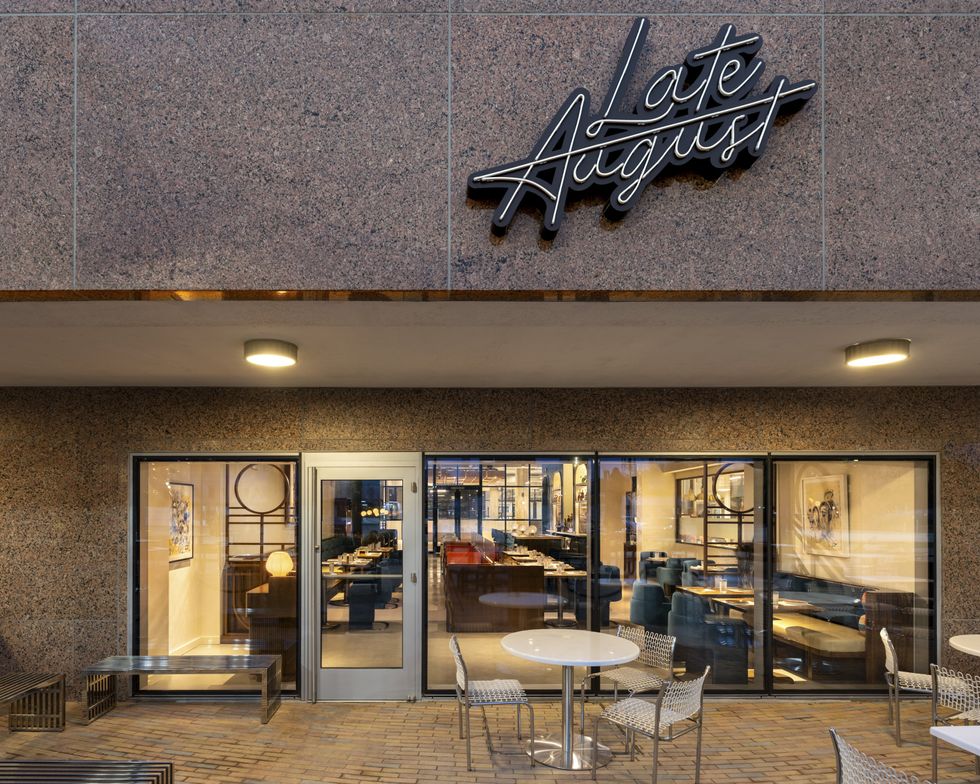Between pounding water and bananas all day last Friday in preparation for the 170-something-mile-long MS 150 (the name is a misnomer), I'd become an obsessive weather.com checker, convinced that I and the 13,000 other riders were going to be pedaling all the way to Austin in drizzle.
For most people, the impending weather forecast was probably no big deal, but I had never ridden in the rain before and heard that the skinny tires on road bikes are not designed for rain riding. My worrying was largely pointless. The weather was great, for the most part.
Riders could start from three places. I, of course, decided to start from the Omni — which is the longest route. Hearing Clay Walker sing the National Anthem was very cool except it was too dark to see him at six-something in the morning, and all I could think about was the nap I was going to take upon my arrival to La Grange. (It was awesome.)
As thrilled as I was to raise what now totals $1,120 — fundraising continues for at least a month — I think each additional donation reminded me that I actually had to bike all the way to Austin. I started training seriously in the beginning of February, and the farthest I had ever ridden at one time was about 55 miles.
What rookie?
Somehow, my lack of experience escaped my memory on Saturday morning, and I found myself riding alongside some serious veterans on my team for the entire 100.44 miles. We finished a "century," cyclists' term for 100 miles, at 12:30 pm on Saturday, averaging over 18 miles per hour thanks to an awesome tailwind for the majority of the ride. (The headwind that hit us for the last 20 or so miles was killer, and I ended up leaving my new riding friends behind just to cross the finish line faster.)
We skipped every other rest stop. We skipped lunch. (Who wants to eat lunch at 9:30 a.m., anyway?) And the hugest and most glorious hamburgers I've ever seen were waiting at our team's tent in La Grange. Because we were near the front of the pack, we never saw any of the more colorful MS riders. I'd heard stories of people riding on unicycles, in funny costumes, and on rollerblades — I wish I could have seen them. Anyone have pictures?
I ate my weight in food at La Grange. That night as I walked through the campsite I saw people downing beers by the pitcher. It was the first time in my life that you couldn't have paid me to drink alcohol, and even the thought of drinking from the margarita machines in our tent made me cringe.
In hindsight, it probably would have been beneficial to be drunk for Sunday's ride so I would remember less of the horrible hills that we had to climb. I, again, of course, decided to ride through Bastrop State Park, a route that many forgo. The ride through the park was beautiful, but it's called the "challenge route" for a reason. Many claim that it's the highlight of their MS 150 experience every year.
Once I can walk up or down stairs comfortably again, I might agree. For now, I ache.
I think the ability to keep going on Sunday separates veterans from first-time riders like myself, because the second I sat down on my bike on Sunday morning, I thought: "You have got to be kidding me. I cannot stay in this position for five more hours." I didn't push myself too hard on Sunday and finished around 1 pm, riding into the middle of downtown Austin with the Capitol in sight right as I crossed the finish line. 175 miles, done.
Finishing was an awesome accomplishment, only made better by all the signs I saw that read, "I have MS. Thank you so much for riding." For those of us who do not have a specific pedal partner — a friend with multiple sclerosis for whom we ride — we were given the option to get a bandana signed by a person with MS. I rode for Kelvin, a man I will never meet but whose signature I carried with me throughout the weekend.
The MS 150 is very explicitly not a "race" but a "ride," and we are all constantly reminded of the reason we ride: To find a cure to multiple sclerosis, to use our bodies and our strength to help those who can't do the same. I felt such a sense of purpose, which is totally addictive and will almost beg me to continue riding every year.
I will likely continue to check the fundraising status of my team and of the entire MS150 for weeks. The ride thus far has raised over $12 million dollars and hopes to raise $18 million, up from the $17.3 million it raised last year. It blows my mind to think about how much research that money can fund.
Leslie Pfeiffer is a medical student at the University of Texas Health Science Center, a graduate of Duke University and now a MS 150 veteran. To make a donation to The National Multiple Sclerosis Society, click here.

 Late August is one of Esquire's best new restaurants.
Photo by Leonid Furmansky
Late August is one of Esquire's best new restaurants.
Photo by Leonid Furmansky